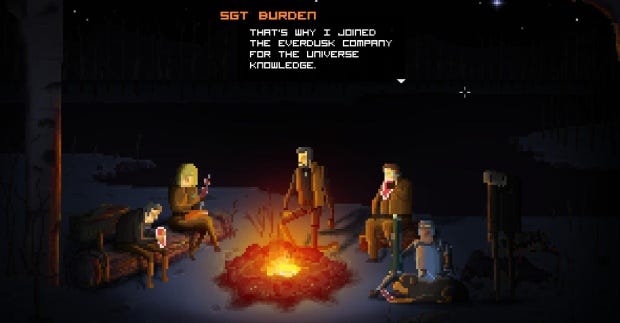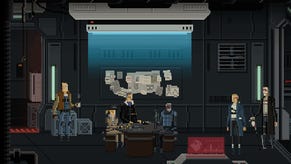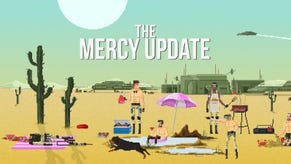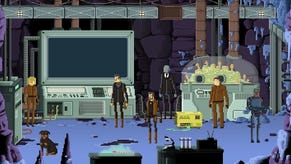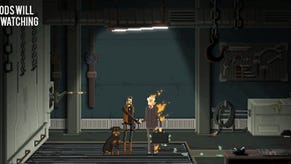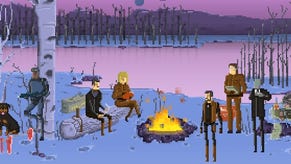Wot I Think: Gods Will Be Watching
And nodding off.
Deconstructeam's Ludum Dare entry Gods Will Be Watching is now a fully-realised game, released by oh-so-impish publishers Devolver Digital. Described as a "point and click thriller", it's, well, not that. It's something else. Something... well, here's wot I think:
You know that feeling when you can’t tell if it’s just you? Whether you’re the one staring in confusion, while everyone else is cheering? Gods Will Be Watching puts me in that place. I have not enjoyed playing this game at all. I thought I was going to. I’m wondering if others will.
GWBW is not a point and click adventure, as is stated by their promotional material. It’s a sort of narrative-led resource-management sim, where you must worriedly choose from menus of conversation options to attempt to push events forward in a direction that doesn’t end in failure. It begins with a collection of people you know nothing about sitting around a campfire after an event you haven’t experienced, talking about people you haven’t heard of. It then flashes back to a year earlier, where you’re apparently a group of terrorists, with some hostages, attempting to hack a computer while holding off rescuing forces. Why? It doesn’t say.
Tell someone to charge up some hacking thing, while ordering another man to “negotiate” with the rescuers (say the same line over and over), and kick the hostages if they’re relaxed but calm them if they’re freaking out (none of which is usefully communicated by their twitchy animations), and don’t not do um something I guess because otherwise it ends. And you start over. And over. And over. You have to rapidly issue orders in turn, hoping you’re magically knowing which to do when, trying to plug leaks as fast as they spring up. Then you lower the difficulty, and get through it, not really knowing why.
Next comes a sequence in which you’re being tortured for days and days. Days and days and days. The same gimmick, over and over – delay time to get enough time to think of a good lie and sustain torture, or confess the truth to escape it, then choose between medical help or information between sessions. Over and over and over. The questions insanely repeating after you’ve given accepted lies for them. Hold out long enough and finally it comes to an end. The insanity is, the monotonous repetition of the sequence had began to work on me. I wanted to confess just to make the damned thing end. I was successfully tortured.
There’s a phrase in story writing, “Show, don’t tell.” I’m beginning to suspect it’s been rather widely subverted to, “Talk about something else, instead of tell.” And I’m not a big fan of it. As a consumer of stories, we are very often left deliberately in the dark, asked to piece together a story from fragments, picking up details as things go along, almost inevitably not in chronological order. And as a concept, it’s one that always intrigues me. In delivery, however, it all too often feels more like smugness on the part of the author. “I know what’s going on, but you don’t!” This is a game that began life as a Ludum Dare entry on the theme of minimalism, but this is not an explanation for the failings in neither the delivery, nor the mechanics.
While it’s determined to not tell you anything about what’s actually happening, early on there’s endless reams of guff about some violent version of baseball, or two people bickering about a private thing between them and not you. All of it is speckled with typos (“reasses” being a personal favourite). In later chapters this becomes more sparse, and instead you're in situations where you have to talk to the same person over and over, and it just delivers the same few lines of dialogue. I don't understand how a game designed to force such interminable repetition upon you couldn't think to write enough extra bits of dialogue to prevent reading the same three lines of dialogue twenty times.
And here’s where it becomes that, “Is this my failing, or the game’s?” thing comes in. I find the monotony of the tasks is just far too much hard work when I’ve been given no reason to care about anyone in the first place. Everything is so achingly slow and repetitive that it becomes only a chore. Why should I give a flying toss who Liam really is, where he really comes from, or why Burden trusts him? Because Liam’s just some pixel guy standing next to some other pixel guy, and they’re all making me dance through their oh-don’t-put-a-click-wrong-but-we-won’t-say-what-wrong-is game.
In some chapters a major character can die. In one in particular, in its desperation to bark its script at you, it sort of feigns a ghost version of the dead guy so it can play out the conversations that would have happened anyway. But the conversations themselves only make sense if both are alive, clearly unchanged. Then, come the next chapter, he’s magically back to life. They always are. Sigh. It takes away any sense of importance.
The realisation that the game is really just a text-based management sim is where I feel most let down. While I adore rogue-lites, and have played so many point-n-click adventures that I can keep full-length ladders in my inside jacket pocket, despite appearances this game is neither. It’s about clicking on the same words, again and again, at the right moment, to stop the thing overheating, or the process from failing, but having to execute this through the far more laborious process of conversation trees. Is it unfair to judge the game for what it’s not? Yes. Instead what I’m doing is wishing it were something other than the empty, laborious one-note thing is really is.
When you complete a chapter, your choices, results and consequences are shown in graphs, alongside statistics of how other players approached the same. You can see if you saw someone live where most saw them die, or if you were cruel where others were kind. It’s a nice idea, but it ultimately feels a little meaningless, since the whole experience feels so meaningless.
It’s so often like it’s taking the piss. One laborious process of identifying a drug for a disease, while powering up a computer, while digging out a tunnel, while resting everyone, while fixing a robot, while charging a defibrillator, while creating adrenaline and sedatives, lets you believe you’re near an end to its repetition, then surprises you by declaring that you’re only halfway there. What’s this meant to achieve? Who enjoys being given massive setbacks, let alone when the process to the apparent success had been so dreary? Although saying that, compared to the complete lack of a twist in chapter 4’s twenty-five cycles of the exact same sequence, perhaps it was a blessing.
It’s beautiful, no doubt. The pixel art is wonderful, and the soundtrack is splendid. Looking at just the screenshots, I’d be reaching for my wallet. But the core game is just so tedious. By the fifth chapter, you’re literally wandering through near-identical scenes of desert, and at this point I’m honestly wondering if maybe this is the point? Maybe it’s some arch commentary on gaming, on our repeating tasks because we’re told to, for meaningless rewards? There’s certainly enough meta-stuff going on along the way to imply this is where it’s heading, but dear me, if so, then the smugness would burst the walls. I really cannot find the will to keep putting myself through it to find out if the point was how much I’m wasting my time putting myself through it. During my fifth go the game announced it was out of memory, and closed itself, and yeah, that will do.
I’m really gutted about this. I’ve been interested in the project since the first screenshots, and there’s unquestionably a huge amount of potential for someone to try to combine long-term survival with resource management in this form. But this is a tiresomely repetitive affair, and snarky with it. Perhaps the big reveal that lies at the end would astonish me, but there’s been nothing to earn the persistence I already put in, let alone any more. Let the gods judge me for that.
